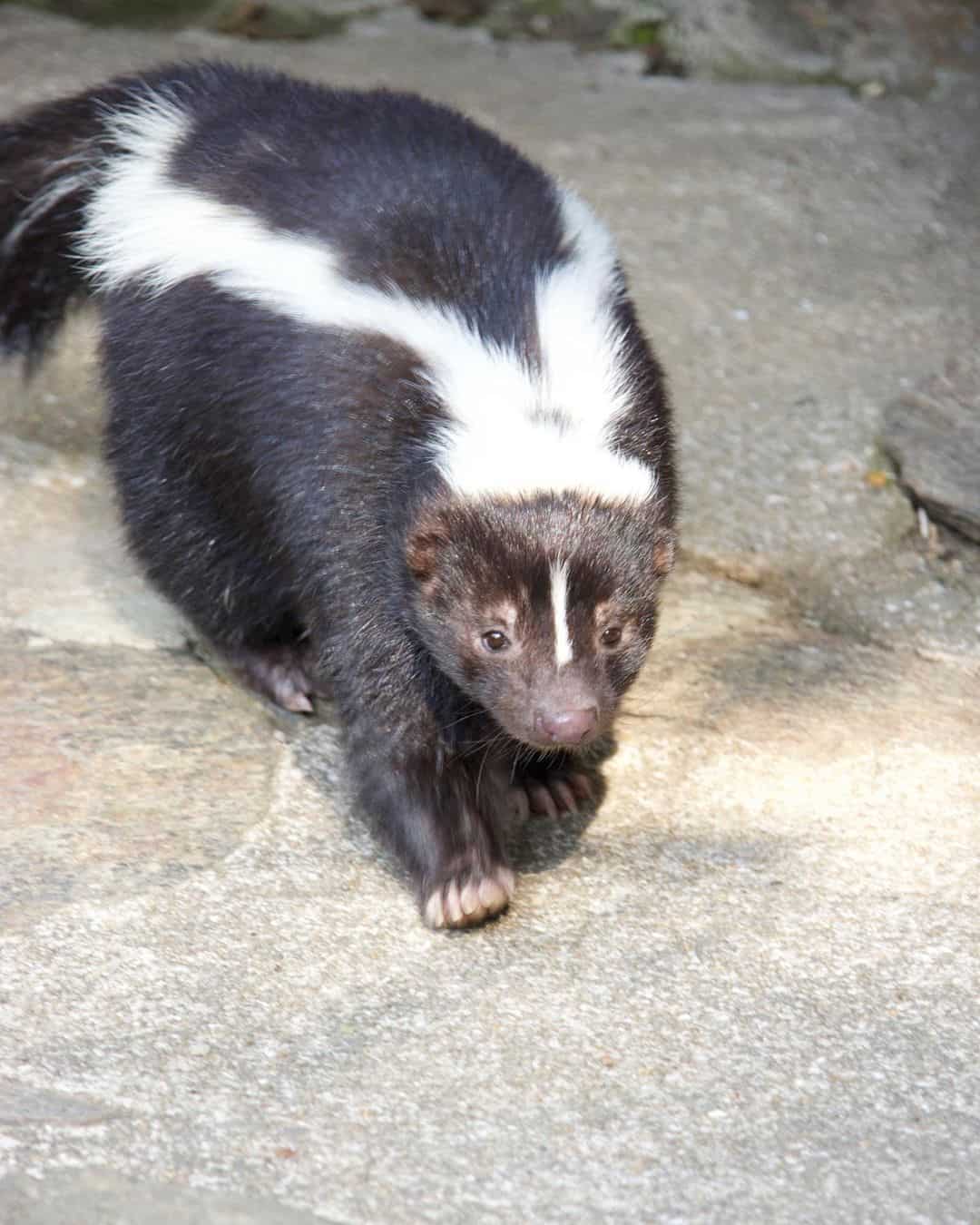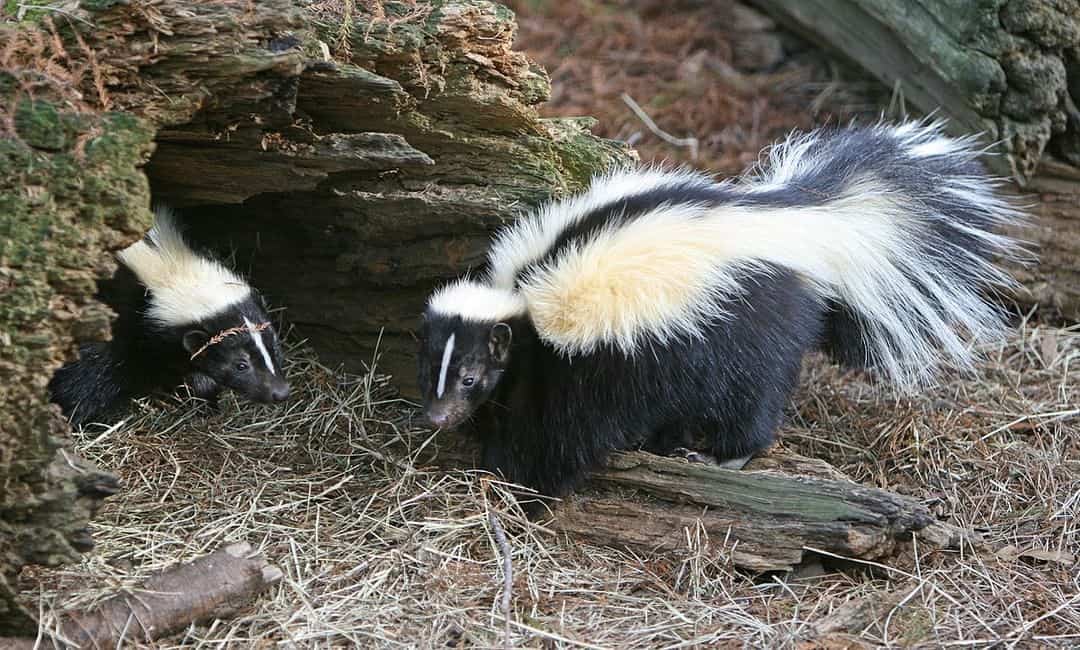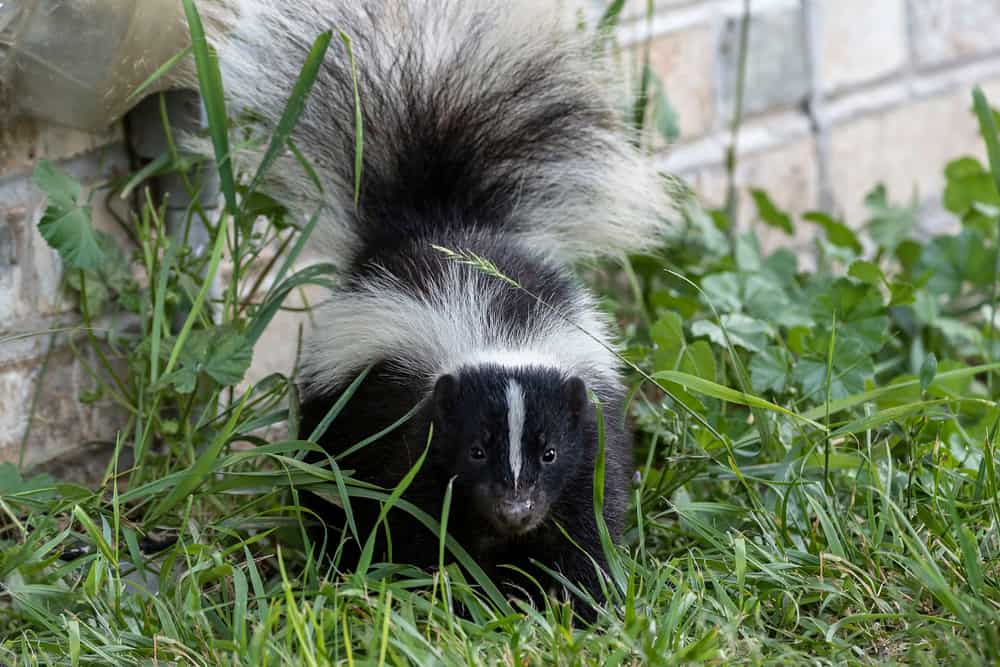You are probably familiar with skunks because of their cool suits that feature lush black fur and two white stripes across the back and sometimes the tail.
They are also famous for the horribly smelling liquid they release from their anal glands (they got the name skunk because of it – the word comes from the word seganku, which translates to “a fox that urinates”).
And maybe you are an unlucky homeowner in whose garage, shed, porch, or garbage cans skunks made a mess in search of food or when trying to make a nest.
But if we asked you what sounds does a skunk make? You probably would not have an answer. And how could you? They do not teach this stuff. We do, though, so feel to keep reading in order to explore a variety of skunk sounds with us.
Skunk Noises: What Sound Does A Skunk Make?
What Sounds Do Skunks Make When Hungry?
You might not expect this from an animal whose working hours begin after sunset, but skunks have poor eyesight that does not allow them to see things about 10 feet away and beyond.
Fortunately for them, they have an amazing sense of smell and hearing that help them successfully rummage through our trash at night. Since they rely a lot on their sense of smell, you can hear them making snuffling and sniffing sounds when they are looking for food.
These animals also have large and strong claws, which they sometimes use for digging dens in which they will live, but much more for plowing through the ground in search of food. For this reason, you can hear them making scratching, tapping, and rustling sounds with their claws.
What Sounds Do Skunks Make During Mating Season?
Skunks’ mating season lasts from February to April (but it can also start in January) and is the period when these animals are the loudest and hang out in large numbers. They are actually quiet and solitary animals during the rest of the year.
Since male skunks are polygamous, meaning one male mating with several female skunks, aggressiveness among males is at a high level, which is one of the two reasons why they are louder than usual.
Screeching, growling, grumbling, and hissing are the most common loud noises they make during mating season.
Another reason for increased vocal activity is their desire to attract the attention of females, which they achieve with chirping sounds.
What Sounds Do Skunks Make When Dealing With Danger?

Like most animal kingdom members, skunks are both predators and prey. We have already explained what sounds they make when looking for food, which means it is time to describe how they vocalize their feelings and sensations when they are face-to-face with a predator.
Due to their poor hearing, it is possible to surprise and startle skunks which will make them start running away from whatever or whoever frightened them.
But, of course, they are not always able to escape. In an attempt to drive away the enemy, the skunk will usually hiss, squeal, or screech.
If the danger continues to approach, the skunk will stomp their feet as a sign of warning, which is why you can hear them making stomping sounds (duh). They also might use their claws to make scratching or tearing sounds in order to scare the predator away.
In case they do not manage to dissuade the predator from attacking them, as a last resort, skunks will use the thing they are most famous for and spray the aforementioned liquid that features a strong and foul odor. When they do this, skunks make a pissing sound.
We used a close encounter with a predator to describe which sounds skunks make when in danger. But they will also make the same sounds in any kind of danger.
So if, for example, you hear a female skunk making some of these noises, that can also mean that she is trying to fight off a male and protect her offspring.
Fun Fact: Because these animals smell much better than they see, female skunks who want to be left alone by male skunks during the mating season will spray the liquid and make them go away that way.
How Do Skunks Sound When Happy?

When they want to express happiness, contentment, or satisfaction, skunks will make smacking sounds with their lips. They will also produce playful and joyful chirps when in this state.
If you want to see, that is, hear this first hand, try rubbing skunk’s belly or giving them something they enjoy eating.
Do Skunks Have Angry Sounds?
Yes, they do. We featured some of them in the previous parts, but a certain sound can be used for more than one situation. Hissing, screaming, screeching, and squealing is the sounds they make when angry.
What Sounds Do Baby Skunks Make?
As is the case with babies of many species of animals, baby skunks are louder than adults. Crying, squealing, cooing, and chirping are among the sounds they make the most when communicating, looking for attention, calling for their siblings, etc.
When a baby skunk looks for its mother or feels in danger, it will usually emit a high-pitched squeal, also known as an eep.
Do not be surprised to see baby skunks stomping their feet or hissing when they are eating around their siblings – they are usually trying to protect their food and practicing for future dealings with much more dangerous animals.
Conclusion
Well, there you have it – a whole lot of skunk noises.
Remember, snuffing and sniffing noises are associated with searching for food and may be followed by scratching and clawing sounds.
Hissing, squealing, growling, grumbling, and chirping are the sounds of skunk mating season.
A skunk in danger will hiss, screech, and squeal. It may also stomp its front feet or piss ugly-smelling liquid when trying to defend itself. On the other hand, a happy skunk will smack its lips.
Their young ones also make a lot of noises, such as crying, squealing, cooing, chirping, eeping, and stomping.
Do not forget to comment if you need any questions answered regarding skunk sounds and noises!
